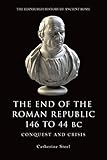The End of the Roman Republic 146 to 44 BC : Conquest and Crisis / Catherine Steel.
Material type: TextSeries: The Edinburgh History of Ancient Rome : EHARPublisher: Edinburgh : Edinburgh University Press, [2022]Copyright date: ©2013Description: 1 online resource (320 p.) : 1 MapsContent type:
TextSeries: The Edinburgh History of Ancient Rome : EHARPublisher: Edinburgh : Edinburgh University Press, [2022]Copyright date: ©2013Description: 1 online resource (320 p.) : 1 MapsContent type: - 9780748619443
- 9780748629022
- 937.02 23
- DG252.6 .S74 2013
- online - DeGruyter
| Item type | Current library | Call number | URL | Status | Notes | Barcode | |
|---|---|---|---|---|---|---|---|
 eBook
eBook
|
Biblioteca "Angelicum" Pont. Univ. S.Tommaso d'Aquino Nuvola online | online - DeGruyter (Browse shelf(Opens below)) | Online access | Not for loan (Accesso limitato) | Accesso per gli utenti autorizzati / Access for authorized users | (dgr)9780748629022 |
Browsing Biblioteca "Angelicum" Pont. Univ. S.Tommaso d'Aquino shelves, Shelving location: Nuvola online Close shelf browser (Hides shelf browser)

|

|

|

|

|

|

|
||
| online - DeGruyter Sufism : The Formative Period / | online - DeGruyter Julius Caesar : The People's Dictator / | online - DeGruyter Court, Kirk, and Community : Scotland 1470-1625 / | online - DeGruyter The End of the Roman Republic 146 to 44 BC : Conquest and Crisis / | online - DeGruyter American Culture in the 1960s / | online - DeGruyter Augustan Rome 44 BC to AD 14 : The Restoration of the Republic and the Establishment of the Empire / | online - DeGruyter Roman Imperialism / |
Frontmatter -- Contents -- Illustrations -- Series editor’s preface -- Author’s preface -- Abbreviations -- Maps -- Introduction -- 1. The crises of the later second century bc -- 2. Domestic politics: violence and its accommodation -- 3. Imperial power: failure and control -- 4. The Social War, civil war and the imposition of a new order -- 5. The limits of autocracy -- 6. The end of the Republic, 70–44 bc -- 7. Imperial expansion: novelty and success -- 8. Elite competition, popular discontent and the failure of collective government -- Chronology -- Guide to further reading -- Bibliography -- Index
restricted access online access with authorization star
http://purl.org/coar/access_right/c_16ec
In 146 BC the armies of Rome destroyed Carthage and emerged as the decisive victors of the Third Punic War. The Carthaginian population was sold and its territory became the Roman province of Africa. In the same year and on the other side of the Mediterranean Roman troops sacked Corinth, the final blow in the defeat of the Achaean conspiracy: thereafter Greece was effectively administered by Rome. Rome was now supreme in Italy, the Balkans, Greece, Macedonia, Sicily, and North Africa, and its power and influence were advancing in all directions. However, not all was well. The unchecked seizure of huge tracts of land in Italy and its farming by vast numbers of newly imported slaves allowed an elite of usually absentee landlords to amass enormous and conspicuous fortunes. Insecurity and resentment fed the gulf between rich and poor in Rome and erupted in a series of violent upheavals in the politics and institutions of the Republic. These were exacerbated by slave revolts and invasions from the east. The instigation of Rome's first professional army to resolve the crises soon made its generals - Sulla, then Pompey, then Caesar - all too powerful. Meanwhile Greek ideas and culture had invaded Rome, contributing to the subversion of the Roman ideal of the free citizen, farmer of his own land, duty-bound to fight in its defence. Catherine Steel tells history of this crucial and turbulent century, focussing on the issues of freedom, honour, power, greed and ambition, and the cherished but abused institutions of the Republic which were central to events then and which have preoccupied historians ever since.
Mode of access: Internet via World Wide Web.
In English.
Description based on online resource; title from PDF title page (publisher's Web site, viewed 29. Jun 2022)


